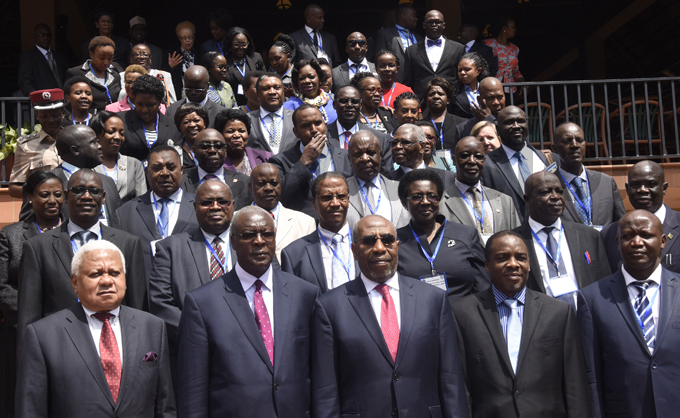Judiciary central to achieving middle income status - Rugunda
Oct 31, 2016
The Prime Minister called for a change of attitude towards the administration of justice

The Prime Minister, Dr. Ruhakana Rugunda has said that the judiciary is an integral factor in steering Uganda from a peasant society to a progressive and middle income status by 2020.
He said that by correcting century long injustices against humanity such as slavery, racism and violence against women, and by demonstrating that there is a civil way of handling political issues, the judiciary is playing an integral role of steering the country to a middle income status.
"Government is looking at the Judiciary to maintain peace and stability necessary for economic growth. It is therefore, a fact of life that investing in the judiciary is no longer a luxury but a necessary prerequisite for the transformation of individual partner states in the region," he said.
He was speaking during the opening of a three day conference of the East African Magistrates and Judges which is taking place at Speke Resort Munyonyo, this week. This year's theme is, 'Transformation of Judiciaries in East Africa for improved service delivery: successes, challenges and strategies.
Rugunda said that with the increase in trade since the coming into force of the treaty re-establishing the East African Community, the judiciary's ability to dispose of cases of trade at a faster rate creates a favourable climate for movement of labour, capital and services in the region and increases the pace of integration.
However, he pointed out that there is need for the judiciary to pay attention to increasing public confidence, trust and satisfaction in the administration of justice and that judicial officers must focus on cultivating judicial independence, enhancing efficiency in service delivery, opening up courts to the poor and vulnerable who feel excluded from the judicial process.
"Court processes and policies should be structured around enabling the least served segments of the population to access court services, just like the privileged," he said.

Rugunda called for a change of attitude towards the administration of justice and said that even with a first class IT system, modern building and adequate stationery, if the human resource is lazy, pathetic and corrupt, judiciary transformation is impossible to achieve.
The Chief Justice Bart Katureebe said that there is need to develop a judiciary which relates and responds to the needs of the ordinary person.
"We need to assess the relevance of our services from the point of view of how we respond to the demands of the citizenry in the region. The major way to do this is by enhancing access to justice for all persons through adoption of modern and cost effective methods of adjudication and by developing and implementing people eccentric approaches to justice," he stated.
Katureebe said that though it's a prerequisite that for the judiciary to undergo transformation, there must be a strong legal and regulatory framework and institutional independence, Ugandan judiciary still suffers from unfavourable legal environment.
"We still suffer from non-prioritization of legislation that is meant to strengthen administration of justice. Such laws take too long to be passed which slows progress," he said.
Brenda Kamau, a council member of International Commission of Jurists (ICJ Kenya), despite the progress made by the judiciary to change the old system, access to justice for the common citizen and marginalized groups such as women, youth, disabled and the poor remains a challenge.
